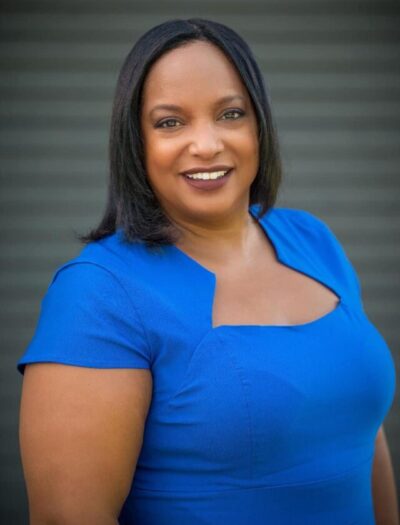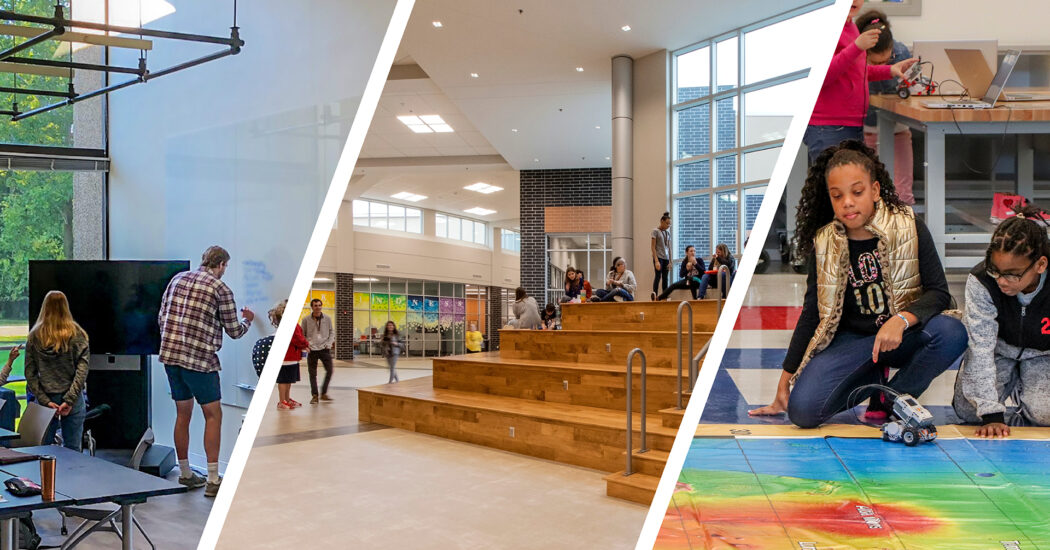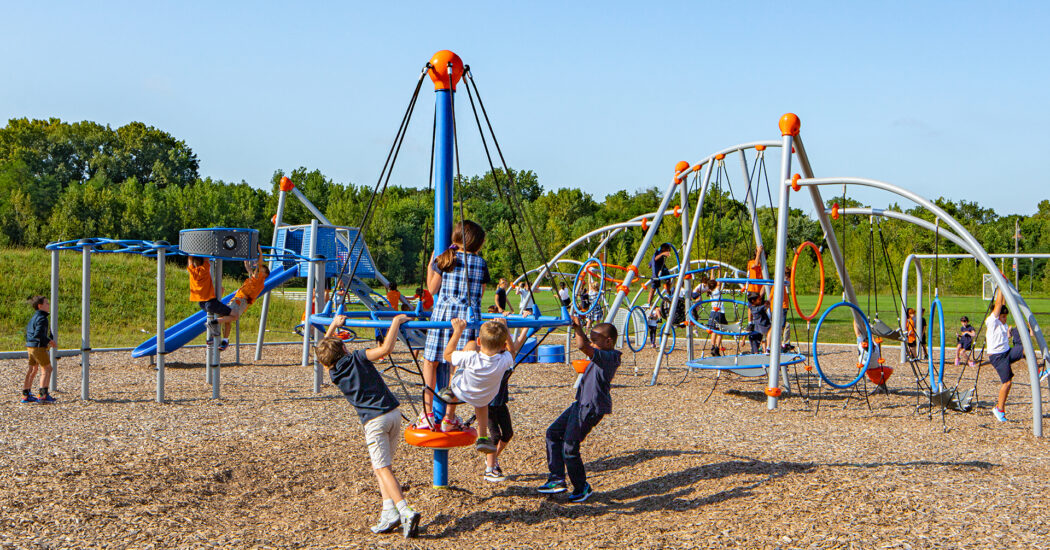Education Redefined: A Conversation with Dr. Nikki Woodson
-
Category
Innovation -
Posted By
Schmidt Associates -
Posted On
Jan 08, 2024
Since May 2011, Dr. Nikki Woodson has served as superintendent for the Metropolitan School District of Washington Township. Overseeing a diverse student body of over 12,000 and nearly 1,600 staff, she leads a comprehensive K-12 public system with a mission to foster equitable, affirming, and responsive education. As Marion County’s first African American female superintendent and one of Indiana’s youngest, Dr. Woodson’s career in large urban public schools’ spans from teaching to various directorial and administrative roles. Her academic achievements include degrees from Ball State University, Butler University, and Purdue University, and she is a published author and columnist in educational leadership. Dr. Woodson’s distinguished career has earned her numerous accolades such as the Graduate of the Last Decade from Ball State, a Purdue University Fellow, International Educator of the Year, and many more honors from prestigious organizations. Her influence extends beyond the district through board memberships and national recognition, including an invitation to the White House Future Ready Summit. To get the full story on Dr. Woodson’s tremendous leadership journey, we connected with her recently.

Let’s start with your early influences. What got you interested in the field of education?
My story is very unique. I knew from a very, young age that I was going to be an educator. My parents have photos of me engaging in play teacher mode from a young age. But most interestingly, my high school counselor wrote a letter of recommendation to my university in which I was offered a full ride based on that recommendation and other portfolio work. But she said, Nikki is going to be a CEO or superintendent of a public-school corporation in Indianapolis. This was in high school because my goals were that crystal clear back then. And she went on to say how I am very certain when I set a goal, I make the path to reach it. And so, I’ve known not only did I want to be an educator, but I wanted to be a public educator and my ultimate job was to be a public school superintendent.
Were your parents involved in education or did you have a teacher who was your role model?
No one in my family was in education, but I had a lot of people surrounding me and asking, “Are you sure? There are other fields. Do you want to explore? Would you like to meet people in other professions?” But I was crystal clear in my mind what I wanted to do. My mother who’s no longer with us just always taught us whatever you do, be the best at what you do. She had high expectations for us, no matter what we decided to do. So, if I was going to be an educator, I needed to be one of the best.
You did a full circuit of Indiana colleges. What did those different college and university experiences help you learn about what great education looks like?
Each of those had a different focus. Ball State was a focus on my teaching license or my pedagogy and developing my skill sets as a teacher. When I went to Butler, that was focused on my principal’s license and being a building level administrator. And my PhD at Purdue was focused on superintendent and district level leadership. There was certainly a different level of focus in each of those. Schools are extremely complex. Each of those levels taught me pedagogy, research-based skill sets, practice through practicums, and experiences with people already in the field, so that when you receive your degree in education at each of those levels, you’re prepared. I just had the wonderful pleasure of having those experiences at amazing Indiana colleges and universities.
As an assistant superintendent working with special needs, talk to me about. What does that mean as a leader to have worked your way through a system, seeing it from multiple different perspectives?
I knew early on what my goal was, which was to be a superintendent. And I knew that to be a superintendent, I had to have well-rounded experiences within schools and the ecosystem of a district. I specifically sought out different experiences throughout my educational career. Some of the doors were opened for me. Others, I sought out myself, but there’s not a single isolated experience that makes me who I am. It’s the culmination of all of them that are a part of my fabric or quilt of education. You can’t pull out any one thread. It takes all of them to make the quilt beautiful.
That would help you have empathy for people who work for and with you to provide student services.
Yes. Education is a broad base. Even after I became superintendent, I still had learning to go. In my early years as a superintendent, over a course of a year, I specifically sought out to shadow staff members who I never trained for those roles or held during my educational experience. I was a custodian for a day. I served lunches in school lunch cafeterias for a day at various levels. I was an assistant bus driver for a day. I worked side-by-side with front office secretaries for a day. And those learning experiences were equally important to the professional titles that I had held previously. Learning never stops. I’m an educator at heart and I continuously seek out learning opportunities to make me the best that I can be.
It’s 2011. You were the youngest superintendent in the state of Indiana and the first female African American superintendent in the state. You decided you’re going to learn from the people who work for you. You wrote a book and led the district and took time to write a magazine column on educational leadership. How do those things tie together to make that quilt and build on both your own knowledge as a leader, but also the educational capacity of the district?
Being an educator at heart, it’s not my job just to obtain knowledge. It’s my job to share it. By the nature of what I do, I have always sought ways to share what I’m learning or lessons that I have learned from my mistakes. Each of those aspects were efforts to do that. We have built systems and teams and tried things and failed and learned from those. The more I can write about that, share with other educators or the greater community, it’s helpful because I’ve learned from other people who have shared.
You share your wealth beyond yourself, not just with Washington Township, but with the community, including working with the President Benjamin Harrison House and other community initiatives as well. Can you talk a little bit about those?
When I look at things that I have done, it is a bit overwhelming on paper, but they weren’t at the same time. This has been over a span of years that these experiences or my giving back to the community has happened. I have served on many boards. The local international baccalaureate board, the regional baccalaureate board, as well as the international board of governors. That was an amazing experience. I got to visit schools and see and learn from educational systems across the globe. And that was a wonderful experience getting to serve in different capacities and boards, such as supporting the UNCF. I have served on challenge day, which considers the child’s well-being and social emotional learning. I have served in various capacities with organizations here. I have supported the Center for Leadership Development in Indianapolis. I have traveled far and wide to keynote at various national and regional conferences, but all of that is just a part of me sharing what I have learned.
You were also invited by President Obama to join his top 100 educational leaders. That’s a pretty special day. What were you feeling?
It was an incredible day and quite an honor when these types of experiences come along. You have to take a moment and a deep breath and soak it all in being one of 100 superintendents nationwide that was chosen for that very special day at the White House, getting to personally meet President Obama and have audience with him was quite an experience that I will never forget.
International education is a different perspective than most education in the world and certainly more than most public education in the U.S. What is the value that you think it brings to students?
Our national education system in the U. S. becomes very small when you think about the world and the different values, cultures, governments, and authorities over schools and the different complexities and politics that come into play throughout the globe. It is a big world out there. We have so much to learn as women from other countries who have more years and decades beyond what we have experienced. I sought not only to serve on that board, but also to gain knowledge. It’s an educational system that spans across the entire world. Our meetings for our learning as a board of governors was held in all of the regions of the world that IB serves, and so a lot of airplane miles, but also a lot of gained international education knowledge at the same time. We have so much to learn from each other. There are great similarities when you talk to parents in other countries and compare that to what parents want for their kids here. There are great similarities and there’s great differences, and neither pit us against each other. It’s a beautiful thing that when we can learn from each other globally and across the world.
You’ve done so many great things and have accomplished a lot, but perhaps one of the greatest was running the largest referendum in the state during COVID. How did you achieve stakeholder buy-in?
The biggest complexity that came with our 2020 referenda was coming off the back of our 2016 community referenda where we asked for at the time, the state’s largest construction referendum, as well as operating funds to support programs and staff in our schools. We had to help our community understand why we’re here again, four years later, asking for more monies for the same things. Additionally, we saw the uncertainty of the pandemic that spring. There were a lot of questions, but not a lot of answers. The one thing that I knew was that the needs that we were asking for were not going away, regardless of what this pandemic brought. That’s what we had to educate to our community on. We are blessed to have a supportive community in Washington Township who successfully passed both the 2016 and the 2020 referendas that we asked for on the ballot, but that came after extraordinary years of stakeholder communication, stakeholder building of trust, answering stakeholder questions, even though we may have felt we’ve answered that question 20 times to that stakeholder, we hadn’t. I had to remain accessible. It was a time that maybe at minimum five, six nights out of the week I was in church basements, in somebody’s home, or in our schools, giving presentations or just getting to know stakeholders or answering their questions. Most communities understand that great schools equal great communities and great communities equal great home values, so it’s a super simple formula. The part that we had to educate on is why our schools can’t stay great based on the state funding that we receive and why we have to ask taxpayers for referendum funds to support the future of our schools That education process is a long process to reach. The lowest percent of stakeholders are parents in our schools.
So, you think, well, parents understand, yes, but they comprise of the lowest percent of residents in most of our communities around Indiana. And so reaching the non-parents or the stakeholders in our communities who don’t have children actively engaged in our schools is a task. But they have to understand the need. They have to understand the complexities of school funding and, what this means for their future, for their community. Thankfully, we were able to successfully do that in Washington Township, not on my own accord, but with an amazing team that helped us get there.
Your ongoing communication is impressive. Can you explain why this was so imperative?
Absolutely. When you go after renovations of an entire school district, meaning 15 facilities for us, you have choices to make. You can choose to only update and renovate certain facilities, or you can make the decision for equity across your construction projects so that no one is left without an innovative facility at the end of the time frame. We made that gutsy decision that we didn’t want any school, any part of the district left without a 21st century, beautiful learning environment for their students and their community. That means 15 facilities needed updating and a renovation. The depth of those renovations obviously differed building to building based on the age and the lifespan of what was needed to be done. But we decided every part of our district deserves this because every part of our taxpayer base in our community as well as our students deserve that, and especially the staffs inside of those school facilities. We didn’t do that alone, though we got input from our professional partners. We even asked for input from our parents and stakeholders. We had feedback from students. Some of my best sessions were asking what students wanted in their future learning environments. And certainly, our professional staffs gave us detailed input about what would be best to foster a great learning environment in the 21st century.
How did you introduce local businesses and encourage their participation in the process?
That has been one of the most exciting parts. We have student interns engaged in all facets of our construction projects right now. We highlight them on our website. We celebrated some at our board meetings this past semester, and that has really been exciting to see come to fruition. We have businesses involved with us. Our professional partners have been all hands-on deck, making sure that our students are involved in small ways from an elementary school where they were explaining what an engineer does to having students intern with engineers in some of our high school experiences. That truly has been a joy to see how our community partners have helped us. We also have seen a developing need, so we are creating a brand-new class starting next year at our career center that the school board just approved this month. Construction trades is coming back to our career center. We’re super excited about that. Yet again, another opportunity for our kids to tie directly into our construction projects and continue learning. It’s a job that cannot be outsourced. The actual people are building something on a site.
You have kept a group of strong leaders. What do you do to make sure that where they choose to work is Washington Township?
Early on in my administrative career, I realized I’m only as good as the people I surround myself with. I had a goal early in my administrative career to hire well. Once you hire well, that is half the battle. That’s exactly what I’m experiencing in Washington Township. I’m surrounded by an incredible team. They could be anywhere they choose to be because they are the top at what they do. They’ve had the most experience at what they do. My team is all hands on-deck and the beauty of that is, no matter whether it’s business, finance, human resources, operations to our teaching and learning team, everyone has that best eye or the best decision making from the student lens at hand. That to me is first and foremost. My team keeps me energized. When you create a team, you become a family. We are like family in Washington Township. When we speak or we give salutations to each other, it’s from the Washington Township family or from your family in Washington Township. Creating that climate and culture is super important not only for retention of your current staff, but also the recruitment of a future staff. We have had some people of our team leave, but successfully they’re leaving to promotions and that next step in their career, which is always exciting because they deserve it.
How do you think about mentorship and career development for your young talent that you bring on?
Today’s generation is different than even decades ago when I started in education. I don’t think in the future we’re going to find people with decades and decades in the same school corporation or in the same business or dedicating to the same firm for a long time. This generation moves quite a bit, and we need to reimagine ourselves accordingly. It’s not a matter of making sure people understand their opportunities within your organization, understanding as an employer, what your employees want for their next steps and where they might want to go throughout their career. It’s a different dynamic now with employment. Most of them haven’t written out their life plan at 17.
What’s next for the district? Big, big picture, you are now the queen of the world in the next 10 years. What’s going to change about how education is provided and what students need from their educational environment?
Out of tragedy comes opportunity. We saw a great deal of tragedy and challenge and complexity out of the pandemic. But out of that comes a wonderful opportunity for us as educators to reimagine what education is. If I had that crystal ball and could step into the future, I would hope that people would be talking about how Washington Township really reimagined what that school experience was after the pandemic and created something that’s going to prepare kids for their future. We don’t know exactly what that is right now, but we’re in the process of that. What we do know is we can’t go back to doing school like we did prior to the pandemic. There is not a back to normal. It’s just back to a reimagined future. That’s what we’re trying to create right now.
If you were to tell, young Nikki at 17 one piece of advice knowing everything that you know right now, what do you wish you had known when you had written that plan at 17?
I would tell her that perfection is overrated. I would tell her that the journey is quick, fast, and furious. And before you blink, you’re at a completely different chapter of your life. So just take deep breaths along the way and enjoy each of the chapters. Don’t try to rush. That’s what I would tell her.
You have made a difference in the lives of thousands of kids over time. Is there one story that stands out where you felt like, ok, that is a tangible difference and that young person is going to be going to be all right?
Sure. I probably could think of two. First, when I was a principal, a black parent who wanted to talk to me and I’m calling her back after several other parents, and she said, “Hey, I wanted to tell you that my child came home and said “Mommy, my principal is a black girl. I didn’t know black girls could be principals. And it was in that small moment that I realized you never know the impact that you’re having on others. It helped me step back and realize the impact we can have just by being in these positions The second is probably more recent and this is in Washington Township. I pride myself in making a point to be a part of our students lives. At this point in time, I’m at the high school quite a engaging with students. I can be a better leader if I have a better understanding of what students are experiencing. This particular day, I’m at North Central High School and a female student is not making a good choice. I pulled her aside. She was getting loud, she was getting a little aggressive with her language, and this is during a passing period. I pulled her aside. and she’s saying, “Dr. W, you don’t understand,” and went on to try to tell me what I didn’t understand. And I said, “you’re better than this. Think about your future. Not right now. Make better choices…” Advance five years. She’s writing me from college to tell me about that pull aside moment and how it mattered to her and how she still remembers how I said, “don’t think about right now. Think about your future and your future goals. Keep that in mind, not the right now.” That reminded me that it’s not the big strategic plans or the school improvement plans or the big initiatives all the time. Sometimes it’s the smallest moment that can make a difference to someone. Those two have huge impacts on me constantly. That’s beautiful.
Final question: what’s the one book that you’re either reading right now or that you have read that you would recommend to everybody?
I’m a profuse reader. I don’t read one book at a time. I read multiple and the one by my bedside stand and then the one I keep in my car for when I just have a few moments. Right now, it’s A Demon Copperhead. It’s a beautiful tale of tragedy and triumph of children in poverty and dire poverty It’s a beautifully written book. The second one is That Bird Has My Wings. It’s about a wrongfully convicted man on death row, how he got there, and his life experiences. Both are very different takes from both angles, but both are profound to me right now. I just love to devour books.
Excerpts from this Q&A were taken from a podcast episode with Dr. Woodson in January 2023. Listen to the full episode on Buzzsprout or wherever you get your podcasts.







